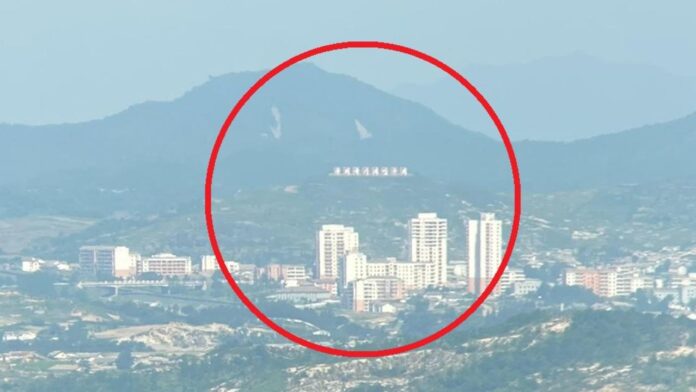[ad_1]
I’ve had some rather memorable experiences overseas.
I’ve had the male version of a “vagina steam” at one of Gwyneth Paltrow’s favourite spas in LA, and I’ve watched dead bodies being cremated on the banks of the Ganges in India.
But neither of those compared to my recent visit to the demilitarised zone (DMZ) between North and South Korea, which Bill Clinton once called “the scariest place on earth”.
It was sad, it was confronting, it was bizarre and it was even slightly amusing thanks to an outrageous sign I spotted in North Korea (more on that later).
What is the DMZ?
The DMZ is the most heavily militarised border on earth, with thousands of troops on either side and plenty of landmines in between, making it one of the most surreal tourist destinations in the world.
It’s essentially a buffer zone (250km long and 4km wide) that was established between North and South Korea in the 1950s after the Korean War and was designed to stop an invasion of North Korea from the south and vice versa.
And it’s still very much needed, according to Dr Leonid Petrov from The Australian National University.
“Kim Jong-un would love to invade and destroy South Korea before unifying the country but two issues stop him,” Dr Petrov told news.com.au.
“Firstly, the ROK (South Korea) is a US ally and immediate military retaliation is likely to cause chaos in North Korea and potentially lead to the South-led unification of the country.
“Secondly, even if the US does not support the ROK and North Korea prevails in its military campaign against the South, Kim Jong-un will have a serious trouble in ruling the 50 million compatriots who speak, behave and think differently compared to their northern brothers and sisters.”
What can you actually see at the DMZ?
The DMZ is about 50 km from Seoul and can only be visited as part of a guided tour.
Most tours last between five to seven hours and include stops at several different locations.
In my opinion, there were two main highlights.
The first was Dora Observatory, where you can stand on top of a viewing platform and use binoculars to peek into North Korea.
I was able to spot some North Koreans riding bicycles and working in a field, and also got a glimpse at the infamous Kijong-dong, which is known as the ‘propaganda village’.
“The North Korean government says the village contains a 200-family collective farm, a childcare centre, schools, and a hospital,” Seoul City tour guide Grace Cho told me.
“However, the South says it’s a fake, uninhabited village built in the 1970s in a propaganda effort to encourage South Korean defection, and to house local soldiers.”
That’s not the only piece of propaganda visible in North Korea from the Dora Observatory.
On clear days, tourists can also see a sign on a mountain in North Korea’s Kaesong city which says: “Our nation is the best”.
Quite a bold claim for a country that is rumoured to be battling a famine so serious that people are starving to death.
Through the binoculars, tourists can also see massive flagpoles on both sides of the DMZ, flagpoles which perfectly demonstrate the petty one-upmanship between the two countries.
You see, South Korea built a 100 metre tall flagpole with a 130kg flag on their side of the DMZ in the 1980s, and North Korea responded by building a 160 metre tall flagpole with a 270kg flag.
Anything you can do, we can do better …
The other highlight of the DMZ tour was a visit to one of the four discovered tunnels that North Korea has dug into South Korea, allegedly for the purpose of a surprise invasion.
“There are believed to be at least 10-20 more tunnels that haven’t been discovered yet,” Ms Cho told me, with the South Korean armed forces still dedicating resources to finding and destroying them.
The third tunnel, which I visited, was discovered in the 1970s and lies 73 metres below ground, stretching more than 400 metres into South Korea from the military demarcation line.
Tourists are allowed to walk down a steep ramp for a glimpse inside the tunnel (no photos are allowed).
How can you get to South Korea?
Jetstar has been flying direct from Sydney to Seoul for just over a year, offering three return flights every week.
Due to strong demand, a fourth return flight will be available from February next year, and around the same time Jetstar will also launch a new route between Brisbane and
Seoul.
This writer travelled to South Korea as a guest of Jetstar
[ad_2]
Source link


